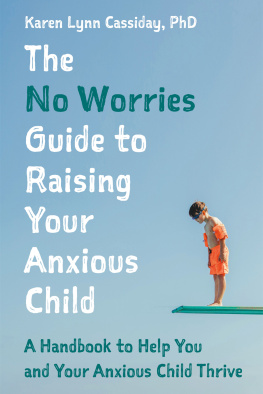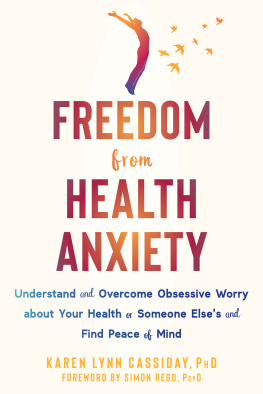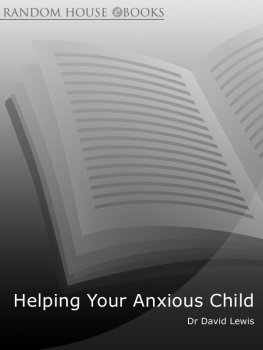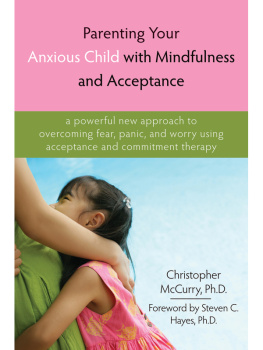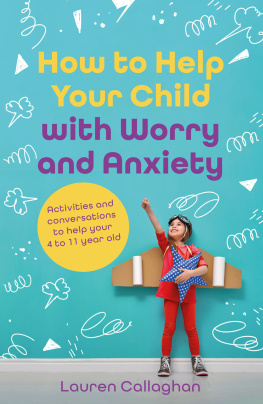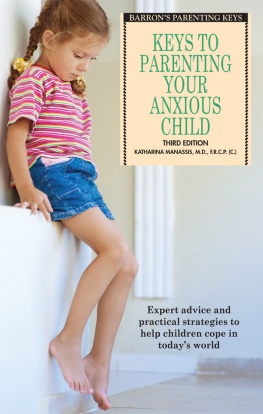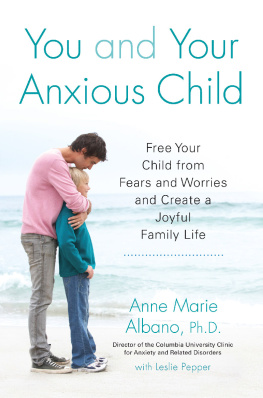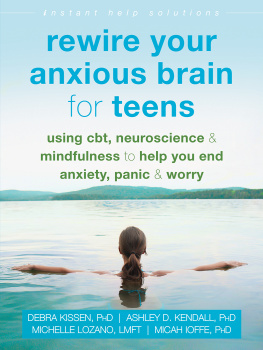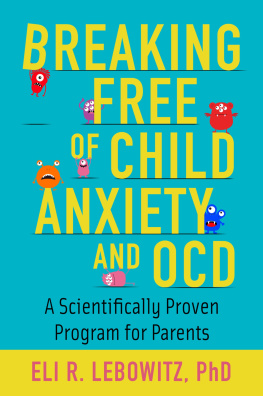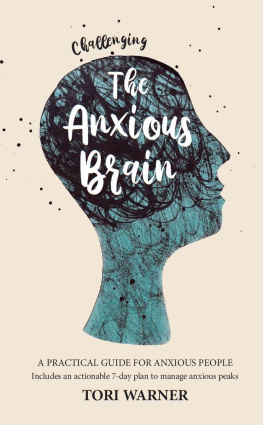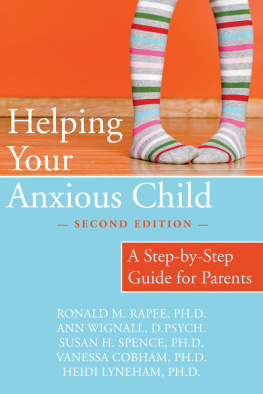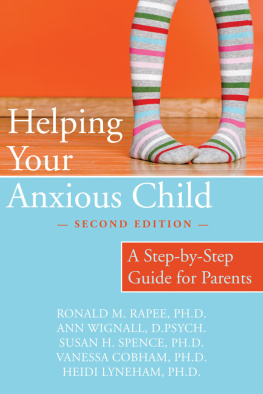Contents
Page list

of related interest
How to Have Incredible Conversations with your Child
A Collaborative Workbook for Parents, Carers and Children to Encourage Meaningful Communication
Jane Gilmour and Bettina Hohnen
ISBN 978 1 78775 640 3
eISBN 978 1 78775 641 0
The Incredible Teenage Brain
Everything You Need to Know to Unlock Your Teens Potential
Bettina Hohnen, Jane Gilmour and Tara Murphy
Illustrated by Douglas Broadley
Foreword by Sarah Jayne Blakemore
ISBN 978 1 78592 557 3
eISBN 978 1 78450 952 1
Teen Mental Health in an Online World
Supporting Young People around their Use of Social Media, Apps, Gaming, Texting and the Rest
Victoria Betton and James Woollard
ISBN 978 1 78592 468 2
eISBN 978 1 78450 852 4
Starving the Anxiety Gremlin
A Cognitive Behavioural Therapy Workbook on Anxiety Management for Young People
Kate Collins-Donnelly
ISBN 978 1 84905 341 9
eISBN 978 0 85700 673 8
My Anxiety Handbook
Getting Back on Track
Sue Knowles, Bridie Gallagher and Phoebe McEwen
Illustrated by Emmeline Pidgen
ISBN 978 1 78592 440 8
eISBN 978 1 78450 813 5
The No Worries
Guide to Raising
Your Anxious Child
A Handbook to Help You and
Your Anxious Child Thrive
Karen Lynn Cassiday,
PhD, ACT

First published in Great Britain in 2022 by Jessica Kingsley Publishers
An Hachette Company
Copyright Karen Lynn Cassiday 2022
The right of Karen Lynn Cassiday to be identified as the Author of the Work has been asserted by her in accordance with the Copyright, Designs and Patents Act 1988.
Front cover image source: iStockphoto. The cover image is for illustrative purposes only, and any person featuring is a model.
All rights reserved. No part of this publication may be reproduced, stored in a retrieval system, or transmitted, in any form or by any means without the prior written permission of the publisher, nor be otherwise circulated in any form of binding or cover other than that in which it is published and without a similar condition being imposed on the subsequent purchaser.
A CIP catalogue record for this title is available from the British Library and the Library of Congress
ISBN 978 1 78775 887 2
eISBN 978 1 78775 888 9
Jessica Kingsley Publishers policy is to use papers that are natural, renewable and recyclable products and made from wood grown in sustainable forests. The logging and manufacturing processes are expected to conform to the environmental regulations of the country of origin.
Jessica Kingsley Publishers
Carmelite House
50 Victoria Embankment
London EC4Y 0DZ
www.jkp.com
Contents
Authors Note: For the sake of convenience, I will refer to all offspring, ages one through young adult, as children and use the gender-neutral pronouns them, they and their to respect the variety of ages, developmental stages and expressions of gender reflected in all children.
Trigger Warning: This book mentions content that might be upsetting to readers who have emetophobia (fear of vomiting), anxiety about illness, medical procedures or medical instruments, distress about the mention of dying and death, difficulty with pregnancy, distress about the mention of disability and distress about the mention of mental illness.
CHAPTER 1
Accidentally Getting
the Short Stick in the
Game of Parenting
Have you ever secretly watched families with disabled kids, misbehaving kids or kids with mental illness and pitied them, or felt sorry for them? When you thought about the parents of these families, have you ever elevated the status of the parents to heroic Arent they amazing! Look at what they do with such a difficult situation? or secretly thought a few judgmental thoughts such as Wonder what went wrong in that family that their kid ended up being so anxious? or Their kids wouldnt be so out of control if the parents would just follow through with good discipline or get therapy. When you were observing those families, it probably never occurred to you that you might end up being one of those parents, the parents who have the challenge of trying to figure out how to raise a kid whose upbringing is destined to be different no matter what. You might even secretly have the thought that even though you adore your child, you really feel overwhelmed when your childs anxiety makes the day really difficult, really grueling and like something that feels like drawing the short stick in the game of parenting.
There are many things that parents like to avoid thinking about and talking about when it comes to the topic of raising an anxious child. No one likes to talk about the fact that if you have a child with any mental health challenge, your own mental health and physical health are at risk. Parents of children with any type of disability, such as attention deficit hyperactivity disorder (ADHD), developmental delays, or any mental illness, are more likely to die an average of ten years younger than mothers of normally developing children, and the parents of kids with any of these challenges have a 20 up to 80 percent risk of divorce (Grcevich, 2016). Eighty percent of parents of children with mental health disorders or disabilities are likely to suffer from anxiety disorders and depression (Scherer, Verhey & Kuper, 2019). If your child or teen requires lots of intervention, then you are at an even greater risk simply because it is more difficult to take vacations, get adequate sleep or to spend relaxed time with friends or family. Additionally, no one likes to mention the fact that the younger your child is when they first show symptoms of anxiety then the more likely they are to need repeated intervention and to develop other mental health disorders throughout their lifetime. This is why so many of the parents of my young patients look at me with dismay when I talk about their likely need to return to treatment even though they just successfully completed a course of treatment. Being the parent of an anxious child is likely going to be an ongoing challenge no matter how well you do your part.
As I write these facts, I think back to what happened to me as I careened back and forth between being totally smitten and in love with my firstborn and being totally undone by things that were not like what other parents experienced. I did my best to put on a brave face, just in the same way that I see the parents of my patients put on a brave face. I was too terrified to face my worries about what might be ahead for my child and my family. I was a mental health professional who knew too much and a mother who wanted to hope for the best. I was lost. What I most wanted to know was whether or not there was anything that I could do to help my child grow into a competent, kind and useful adult. I had flocks of therapists and doctors who were all focused on single components of my childs development but none of whom could tell me what to do about developing my childs resilience, character and self-worth in a life that I knew would be challenging from the beginning. What good is being able to walk and talk if other people are put off by my son running away each time he feels shy around other kids? Being really bright might be nice, but if your child is unwilling to participate in any activities other than video games and schoolwork, then being bright is not of much use.

